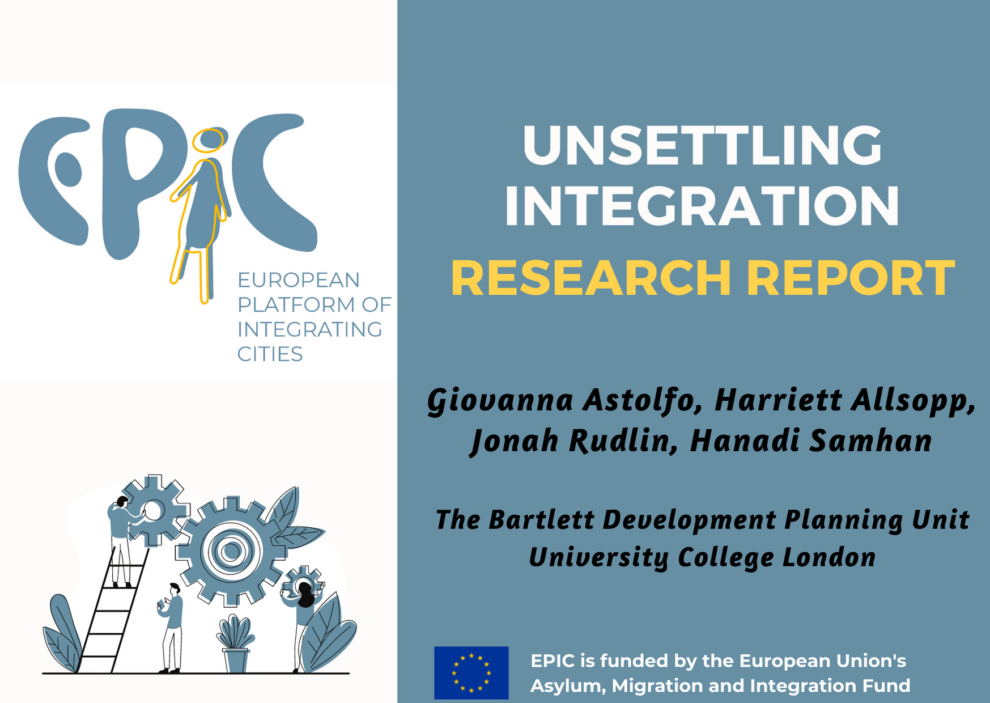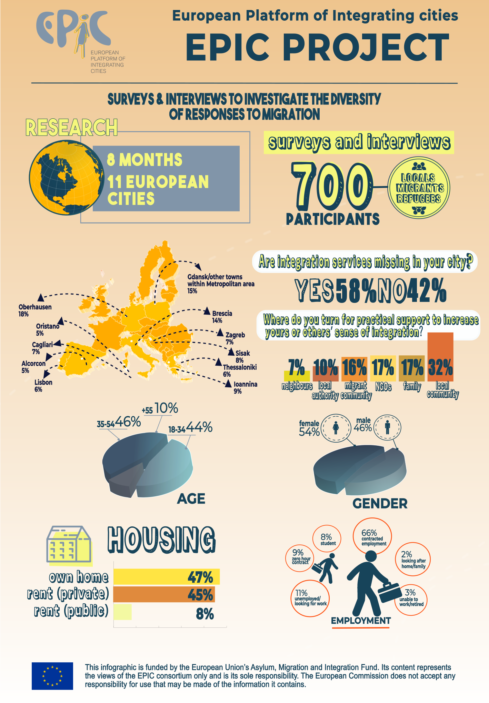
“Unsettling integration”. The EPIC research report
Access the EPIC research report here
Research on migration and integration today in Europe especially occurs within a discourse that is pervaded by racism hard to avoid. Integration has failed, both as a political way to describe the process of inhabitation, and as a research concept to understand such processes. By exposing the epistemological violence of migranticised language and developing alternative concepts and frameworks delinked from structures of power and privilege, EPIC research attempts to move away from a rigid, obsolete and colonial notion of integration, to embrace the idea of inhabitation as a relational practice constituted by transformative formal and informal encounters between displaced people, places, institutions and services that are developed to endure and maintain life. Inhabitation is ultimately the result of complex daily strategies of learning, navigating and governing the city.
Such an understanding enabled us to shift our focus onto the historical and present experiences of those who ‘have to integrate’, recognizing the centrality of urban inhabitants, including migrants’ and refugees’ own assessments. In collaboration with 15 EPIC partners across all nine cities, a team of researchers based at the Development Planning Unit (UCL) have collected and reflected upon people’s accounts of practices – amidst improvisation, precarity, alternative scripts of citizenship and how state rules are negotiated. The team included academics, post-doc and practitioners – Giovanna Astolfo, Harriett Allsopp, Jonah Rudlin and Hanadi Samhan; while 700 urban inhabitants, from the metropolitan area of Lisbon to the port city of Gdanks, and from the postindustrial city of Oberhausen to the island of Sardinia have helped us to understand the multiple registers given to the word integration ultimately challenging it, and moving beyond the state as privileged unit of analysis.
The engagement unfolded via online surveys, phone interviews, storytelling and participatory photography. The “Unsettling Integration” Research Report presented on 16 November 2020 summarises the findings from those surveys and interviews, and reflects on the methodology used.
It is structured around the three main phases of the research – the review of the most updated literature and policy on integration; a city profiling section, that we call Eight Urban biographies, where we attempt to delineate a quick profile of each city involved in the research: Gdansk, Alcorcon, Brescia, Sardinia Region, Ioannina, Thessaloniki, Lisbon, Oberhausen, and Sisak; and the presentation and discussion of the findings of surveys and interviews conducted over 5 months.
The report also includes a Methodology section that offers a glimpse into the long struggle to conduct reflexive research during a pandemic. Important things to highlight are that:
- We tried to avoid treating the migrant population as a different unit of analysis
- We have (reluctantly) kept the word “integration” within most of report, but we have rejected thinking of it as an achievement and as a state.
- We acknowledge the limits of this type of research and the fact that is not meant to provide solutions, but rather to foster further reflections
The report starts with acknowledging that the dominant idea of integration often generates exclusion, since it presupposes immobility, a condition not possible for many. Our research wanted to understand what it is said around integration and then confront these meanings with how people perceive integration. It emerged that the notion of integration is limited and currently criticized within scholarship although policy is still catching up.
In conclusion, the research was not about how successful integration of migrants into host societies looks like, or how to achieve better levels of integration. It is rather about unpacking and problematizing the notion of integration, and related research and policy, based on the perception of the people who live it. While research has already moved beyond the static notion of integration, it seems that policy is still catching up.
The findings of the research have also been useful to go beyond ideas of best and successful practices
In the final section of the report, different integration practices are presented as forms or relation, as encounters, with institutions, with people, with places. We have grouped then into practices of care (such as intercultural activities), practices of repair (i.e. legal support), practices of maintenance (housing, education or job placement).
The report is also the baseline for the definition of the capacity building, learning exchange and pilot activities that the EPIC consortium will implement in the next 2 years.
